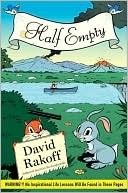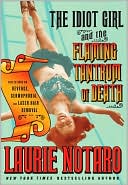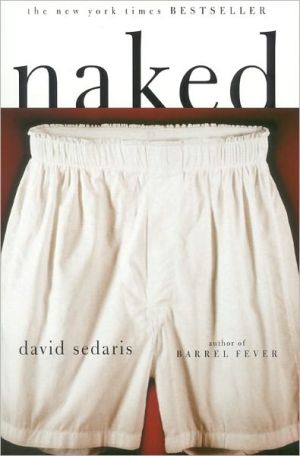Silk Parachute
A WONDROUS NEW BOOK OF MCPHEE’S PROSE PIECES—IN MANY ASPECTS HIS MOST PERSONAL IN FOUR DECADES\ The brief, brilliant essay “Silk Parachute,” which first appeared in The New Yorker a decade ago, has become John McPhee’s most anthologized piece of writing. In the nine other pieces here— highly varied in length and theme—McPhee ranges with his characteristic humor and intensity through lacrosse, long-exposure view-camera photography, the weird foods he has sometimes been served in the course of...
Search in google:
A WONDROUS NEW BOOK OF MCPHEE’S PROSE PIECES—IN MANY ASPECTS HIS MOST PERSONAL IN FOUR DECADES The brief, brilliant essay “Silk Parachute,” which first appeared in The New Yorker a decade ago, has become John McPhee’s most anthologized piece of writing. In the nine other pieces here—highly varied in length and theme—McPhee ranges with his characteristic humor and intensity through lacrosse, long-exposure view-camera photography, the weird foods he has sometimes been served in the course of his reportorial travels, a U.S. Open golf championship, and a season in Europe “on the chalk” from the downs and sea cliffs of England to the Maas valley in the Netherlands and the champagne country of northern France. Some of the pieces are wholly personal. In luminous recollections of his early years, for example, he goes on outings with his mother, deliberately overturns canoes in a learning process at a summer camp, and germinates a future book while riding on a jump seat to away games as a basketball player. But each piece—on whatever theme—contains somewhere a personal aspect in which McPhee suggests why he was attracted to write about the subject, and each opens like a silk parachute, lofted skyward and suddenly blossoming with color and form.The New York Times - Elizabeth RoyteReaders hungry for details—how [McPhee] developed his voice, his sensibility, his "inn-terr-esst"—will gobble up these essays. Readers who shrug, "Eh?" may simply enjoy the scope of McPhee's intellectual curiosity and his great gnashing of words…I will take McPhee any day, on any subject. If it must be lacrosse, or golf, so be it. Most readers won't mind the occasional phrase gone precious—such indulgences only set the spare, move-me-to-tears passages into higher relief. In the age of blogging and tweeting, of writers' near-constant self-promotion, McPhee is an imperative counterweight, a paragon of both sense and civility.
Silk Parachute When your mother is ninety-nine years old, you have so many memories of her that they tend to overlap, intermingle, and blur. It is extremely difficult to single out one or two, impossible to remember any that exemplify the whole.\ It has been alleged that when I was in college she heard that I had stayed up all night playing poker and wrote me a letter that used the word “shame” forty-two times. I do not recall this.\ I do not recall being pulled out of my college room and into the church next door.\ It has been alleged that on December 24, 1936, when I was five years old, she sent me to my room at or close to 7 P.M. for using four-letter words while trimming the Christmas tree. I do not recall that.\ The assertion is absolutely false that when I came home from high school with an A-minus she demanded an explanation for the minus.\ It has been alleged that she spoiled me with protectionism, because I was the youngest child and therefore the most vulnerable to attack from overhead—an assertion that I cannot confirm or confute, except to say that facts don’t lie.\ We lived only a few blocks from the elementary school and I routinely ate lunch at home. It is reported that the following dialogue and ensuing action occurred on January 22, 1941:\ “Eat your sandwich.”\ “I don’t want to eat my sandwich.”\ “I made that sandwich, and you are going to eat it, Mister Man. You filled yourself up on penny candy on the way home, and now you’re not hungry.”\ “I’m late. I have to go. I’ll eat the sandwich on the way back to school.”\ “Promise?”\ “Promise.”\ Allegedly, I went up the street with the sandwich in my hand and buried it in a snowbank in front of Dr. Wright’s house. My mother, holding back the curtain in the window of the side door, was watching. She came out in the bitter cold, wearing only a light dress, ran to the snowbank, dug out the sandwich, chased me up Nassau Street, and rammed the sandwich down my throat, snow and all. I do not recall any detail of that story. I believe it to be a total fabrication.\ There was the case of the missing Cracker Jack at Lindel’s corner store. Flimsy evidence pointed to Mrs. McPhee’s smallest child. It has been averred that she laid the guilt on with the following words: “ ‘Like mother like son’ is a saying so true, the world will judge largely of mother by you.” It has been asserted that she immediately repeated that proverb three times, and also recited it on other occasions too numerous to count. I have absolutely no recollection of her saying that about the Cracker Jack or any other controlled substance.\ We have now covered everything even faintly unsavory that has been reported about this person in ninety-nine years, and even those items are a collection of rumors, half-truths, prevarications, false allegations, inaccuracies, innuendos, and canards.\ This is the mother who—when Alfred Knopf wrote her twenty-two-year-old son a letter saying, “The readers’ reports in the case of your manuscript would not be very helpful, and I think might discourage you completely”—said, “Don’t listen to Alfred Knopf. Who does Alfred Knopf think he is, anyway? Someone should go in there and k-nock his block off.” To the best of my recollection, that is what she said.\ I also recall her taking me, on or about March 8, my birthday, to the theatre in New York every year, beginning in childhood. I remember those journeys as if they were today. I remember “A Connecticut Yankee.” Wednesday, March 8, 1944. Evidently, my father had written for the tickets, because she and I sat in the last row of the second balcony. Mother knew what to do about that. She gave me for my birthday an elegant spyglass, sufficient in power to bring the Connecticut Yankee back from Vermont. I sat there watching the play through my telescope, drawing as many guffaws from the surrounding audience as the comedy on the stage.\ On one of those theatre days—when I was eleven or twelve—I asked her if we could start for the city early and go out to LaGuardia Field to see the comings and goings of airplanes. The temperature was well below the freeze point and the March winds were so blustery that the wind-chill factor was forty below zero. Or seemed to be. My mother figured out how to take the subway to a stop in Jackson Heights and a bus from there—a feat I am unable to duplicate to this day. At LaGuardia, she accompanied me to the observation deck and stood there in the icy wind for at least an hour, maybe two, while I, spellbound, watched the DC-3s coming in on final, their wings flapping in the gusts. When we at last left the observation deck, we went downstairs into the terminal, where she bought me what appeared to be a black rubber ball but on closer inspection was a pair of hollow hemispheres hinged on one side and folded together. They contained a silk parachute. Opposite the hinge, each hemisphere had a small nib. A piece of string wrapped round and round the two nibs kept the ball closed. If you threw it high into the air, the string unwound and the parachute blossomed. If you sent it up with a tennis racquet, you could put it into the clouds. Not until the development of the multi-megabyte hard disk would the world ever know such a fabulous toy. Folded just so, the parachute never failed. Always, it floated back to you—silkily, beautifully—to start over and float back again. Even if you abused it, whacked it really hard—gracefully, lightly, it floated back to you.\ Excerpted from Silk Parachute by John McPhee.\ Copyright © 2010 by John McPhee.\ Published in 2010 by Farrar, Straus and Giroux.\ All rights reserved. This work is protected under copyright laws and reproduction is strictly prohibited. Permission to reproduce the material in any manner or medium must be secured from the Publisher.
Silk Parachute 1Season on the Chalk 7Swimming With Canoes 43Warming the Jump Seat 49Spin Right and Shoot Left 57Under the Cloth 119My Life List 139Checkpoints 165Rip Van Golfer 197Nowheres 223
\ From Barnes & NobleNew Yorker essayist John McPhee is known for his prodigious output, but Silk Parachute is his first book in almost four years. It is also quite arguably the most personal this Pulitzer Prize winner has ever crafted. The collection of essays takes it title from a decade-old article that has become McPhee's most anthologized piece. Like that reverie on a miraculous sky toy, the book floats lightly and gracefully from topic to topic; from the English seacoast and a Dutch valley to lacrosse, the U.S. Open, and strange food served abroad. Editor's recommendation. A portable enchantment; now in paperback.\ \ \ \ \ \ Elizabeth RoyteReaders hungry for details—how [McPhee] developed his voice, his sensibility, his "inn-terr-esst"—will gobble up these essays. Readers who shrug, "Eh?" may simply enjoy the scope of McPhee's intellectual curiosity and his great gnashing of words…I will take McPhee any day, on any subject. If it must be lacrosse, or golf, so be it. Most readers won't mind the occasional phrase gone precious—such indulgences only set the spare, move-me-to-tears passages into higher relief. In the age of blogging and tweeting, of writers' near-constant self-promotion, McPhee is an imperative counterweight, a paragon of both sense and civility.\ —The New York Times\ \ \ Publishers WeeklyThe world’s complex mechanisms beguile us in this scintillating collection of essays, many from the New Yorker. McPhee is fascinated by all manner of intricate and subtle processes. His topic might be the slow geological forces that produced the chalk formations underlying the landscape of northwestern Europe or the stolid wine-making procedures of the French vineyards atop them. It might be the lightning-fast maneuvers in the sport of lacrosse or the evangelizing social networks that are spreading it across the continent. It might be the splashy tricks he and his friends performed with their canoes at summer camp, or the finicky machinery of his daughter’s box camera, its long exposures rendering all moving objects invisible. It might be the New Yorker’s mighty fact-checking juggernaut churning out answers to the most obscure questions, or the oddly shaped mental gears that processed editor William Shawn’s legendary food phobias, or the wondrous workings of a toy silk parachute. However arcane the subject, McPhee wraps it in nicely wrought narrative and piquant characters, as when a random outing with his granddaughter sparks a discourse on theories of mass extinction. The result is a narrative that is wryly humorous, raptly observant, luxuriating in idle curiosity. (Mar.)\ \ \ \ \ Kirkus ReviewsTen gem-quality bemusements from New Yorker veteran McPhee (Uncommon Carriers, 2007, etc.). Here the author is at his most personal, far from the cool remove that has characterized so much of his superb, voluminous output. As usual, these journalistic pieces are not assignments. McPhee examines things he finds intriguing: canoeing, basketball, lacrosse, boats, schooling and magazine writing. The stories-most of them amplified articles from the New Yorker-showcase a writer obviously enjoying himself, whether watching his grandson mucking about in the Thames estuary, where a bilge-spewing ship resembles "a floating cadaver of ulcerated rust," or detailing the work of "champagne riddling," during which "a plug as soft and repulsive as phlegm" is removed from the settling bubbly. Each subject comes with plenty of entertaining material, but also plays on the surface with an appealing glee. McPhee pays a return to golf, a sport he had abandoned many years before when he "envisioned [it] as a psychological Sing Sing in which I was an inmate," and he writes with a high degree of candor and affection about working for the New Yorker-how an article came to pass, the ins and outs of the magazine's vaunted fact-checking department, telephone conversations with William Shawn and even times when the magazine rejected his pieces. Who'd have thought? Throughout, we feel a felicitous warmth of McPhee at work as he shares his stories. Reading these vignettes is like finding the bean in the Twelfth Night cake-each is a surprising, rewarding delight. Author appearances in New York, Princeton, N.J., Kansas City, Denver, Baltimore, Washington, D.C.\ \








